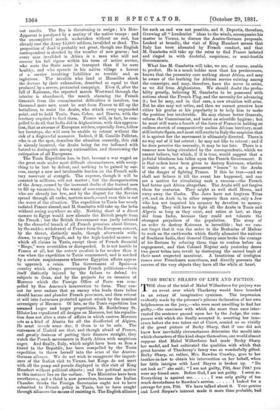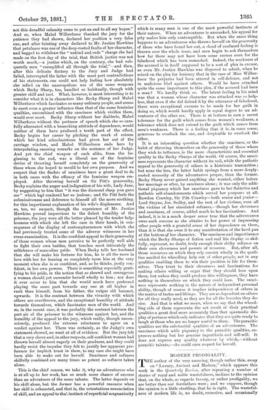THE BECKY SHARPS OF LIFE AND FICTION.
THE close of the trial of Mabel Wilberforce for perjury was an event over which Thackeray would have brooded in an extasy of imaginative cynicism. The impression evidently made by the prisoner's piteous declaration of her own helplessness on the jury,—who were most unwilling to find her guilty,—the sauciness with which she more than once inter- rupted the sentence passed upon her by the Judge, the com- posure with which she finally accepted it, asserting her inno- cence before she was taken out of Court, remind us so vividly of the great picture of Becky Sharp, that if one did not know how inevitably circumstances determine the mould into which characters of this kind shape themselves, one would almost suppose that Mabel Wilberforce had made Becky Sharp her model, and had cultivated the qualities with which that great heroine of Thackeray's fancy was so wonderfully gifted. Becky Sharp, or, rather, Mrs. Rawdon Crawley, goes to her brother-in-law to obtain his intervention on her behalf, when her little intrigue with Lord Steyne is broken up. "Do not look so!" she said ; "I am not guilty, Pitt, dear Pitt! you were my friend once. Before God, I am not guilty. I seem so.
I was only guilty of too Everything is against me much devotedness to Rawdon's service I looked for a peerage for you, Pitt. We have talked about it. Your genius and Lord Steyne's interest made it more than probable, had
not this dreadful calamity come to put an end to all my hopes." And so, when Mabel Wilberforce thanked the jury for the patience they had shown, declared her position a very false one, and after fainting away declared to Mr. Justice Hawkins that petulance was one of the deep-rooted faults of her character, and begged to withdraw the "unkind and rude" charge she had made on the first day of the trial, that British justice was not worth much,—a justice which, on the contrary, she had sub- quently seen "exemplified all through the trial,"—and then, after this delicate flattery to the Jury and Judge had failed, interrupted the latter with the most pert contradictions of his statements, one could not help feeling how absolutely she relied on the unscrupulous use of the same weapons which Becky Sharp, too, handled so habitually, though with greater skill and tact. What, however, is most interesting is to consider what it is in characters like Becky Sharp and Mabel Wilberforce which fascinates so many ordinary people, and seems to exert even a greater influence than that of the same feminine qualities, uncombined with the sauciness which vivifies them, would ever exert. Becky Sharp without her diablerie, Mabel Wilberforce without the pertness of speech which she so care- fully alternated with a beseeching attitude of dependence, would neither of them have produced a tenth part of the effect. Becky begins her career by pitching the mark of esteem which her kind schoolmistress had given her out of the carriage window, and Mabel Wilberforce ends hers by interpolating sneering remarks on the sentence of her Judge. And yet the chief weapon of each alike, from the be- ginning to the end, was a liberal use of the feminine device of throwing herself completely on the generosity of those whom she hoped to mould to her own purpose. And we suspect that the flashes of sauciness have a great deal to do in both cases with the efficacy of the feminine weapon em- ployed. After throwing herself on Sir Pitt's generosity, Becky explains the anger and indignation of his wife, Lady Jane, by suggesting to him that "it was the diamond clasp you gave me" which 110 rendered her so jealous ; and Sir Pitt feels the submissiveness and deference to himself all the more soothing. for this impertinent explanation of his wife's displeasure. And so, too, we suspect, though the experience of Mr. Justice Hawkins proved impervious to the dulcet humility of the prisoner, the jury were all the better pleased by the tender help- lessness with which she left the case in their hands, in con- sequence of the display of contemptuousness with which she had previously treated some of the adverse witnesses in her cross-examination. It is the confident appeal to their generosity of those women whom men perceive to be perfectly well able to fight their own battles, that touches most intimately the selfishness of masculine pride. When Becky tells her, husband that she will make his fortune for him, he is all the more in love with her for leaning so completely upon him at the very moment when she is so confident, and, as he thinks, justly con- fident, in her own powers. There is something especially grati- fying to his pride, in the notion that so shrewd and courageous a woman should yet surrender herself wholly to him ; nor does it ever occur to him that she would much have preferred playing the same part towards any one at all higher in rank than himself, from his father, the vulgar old baronet, upwards. It is the contrast between the vivacity with which others are overthrown, and the exceptional humility of attitude towards themselves, which fascinates men of the world. And so, in the recent case, it was probably the contrast between the
pert air of the prisoner to the witnesses against her, and the humility of the appeal to the jury, which really, though uncon- sciously, produced the extreme reluctance to agree on a verdict against her. There was certainly, as the Judge's own statement showed, no want at all of evidence. But the jury felt that a very clever and, in other respects, self-confident woman had thrown herself almost eagerly on their goodness, and they could hardly resist the impulse they felt to justify her apparent pre- ference for implicit trust in them, to any case she might have been able to make out for herself. Sauciness and softness skilfully combined are many times as potent as softness taken alone.
This is the chief reason, we take it, why an adventuress who is at all up to her work, has so much more chance of success
than an adventurer of the same talents. The latter depends on his skill alone, bat the former has a powerful resource when her skill is exhausted, and that is, the ostentatious renunciation of skill, and an appeal to that instinct of superficial magnanimity which in many men is one of the most powerful instincts of their nature. When an adventurer is unmasked, his appeal for pity makes him only contemptible. But when the same thing happens to an adventuress who throws herself on the generosity of those who have found her out, a cloud of confused feeling is thrown over the whole issue, and men begin to ask themselves how far there may not have been some excuse even for the falsehood which has been unmasked. Indeed, the weakness of the accused is in itself supposed to be a sort of plea in excuse, as even Mr. Justice Hawkins was disposed to admit, when he seized on the plea for leniency that in the case of Miss Wilber- force the perjuries had been uttered in self-defence, and not in malicious libel against others. Would he have attached quite the same importance to this plea, if the accused had been a man ? We hardly think so. The latent feeling in his mind was that a woman whose character was attacked was so help- less, that even if she did defend it by the utterance of falsehood, there were exceptional excuses to be made for her guilt in doing so, which would hardly apply in equal degree to an ad- venturer of the other sex. There is at bottom in men a secret tolerance for the guilt which comes from women's weakness, a tolerance which does not extend to the guilt which comes from men's weakness. There is a feeling that it is, in some sense, generous to overlook the one, and despicable to overlook the other.
It is an interesting question whether the sauciness, or the- habit of throwing themselves on the generosity of those whom they wish to influence, is the more characteristic and essential quality in the Becky Sharps of the world. Of course, the sauci- ness represents the character without its veil, while the pathetic appeal to the generosity of others is a histrionic transaction ; but none the less, the latter habit springs from a more deeply- rooted necessity of the adventuress proper, than the former. Becky Sharp never gained anything she wanted, either before her marriage or after, by sauciness alone ; it was only the addi- tional piquancy which her sauciness gave to her flatteries and pathetic self-abandonments which served her purposes at all. Rawdon Crawley, Sir Pitt Crawley—both senior and junior— Lord Steyne, Jos. Sedley, and the rest of her victims, were all the victims of her simulated softness,—though her cleverness and sauciness, of course, added much to her fascinations. And indeed, it is in a much deeper sense true that the adventuress owes such success as she obtains to her power of impressing other people with a grateful sense of her dependence on them, than it is that she owes it to any manifestation of the hard pan at the bottom qf her character. The sauciness and impertinence which the Becky Sharps of fiction and real life display so skil- fully, represent, no doubt, truly enough their shifty reliance on their own cleverness and powers of resource. But, after all, those resources on which they rely consist wholly in the quali- ties needful for wheedling help out of other people, not in any qualities enabling them to win their position in life for them- selves. They trust to their cleverness and fascinations for making others willing or eager that they should lean upon them, but unless they could produce this willingness, they have nothing in themselves on which they could lean. The sauci- ness represents nothing in the nature of independent personal ability, though of course it implies independence of others in the matter of tastes and likings. They are as dependent on others
for all they really need, as they are for all the luxuries they de- sire. And that is what we mean, when we say that the wheed- ling side of them represents the net result of their practical qualities a great deal more accurately than that spasmodic dis-
play of pertness which only indicates that they are quite ready to laugh at those who are no longer useful to them. The parasitic qualities are the substantial qualities of an adventuress. The sauciness which adds piquancy to the parasitic qualities, ex- presses nothing but her genuine ingratitude and self-will. It does not express any quality whatever by which,—without parasitic talents,—she could earn respect for herself.



































 Previous page
Previous page